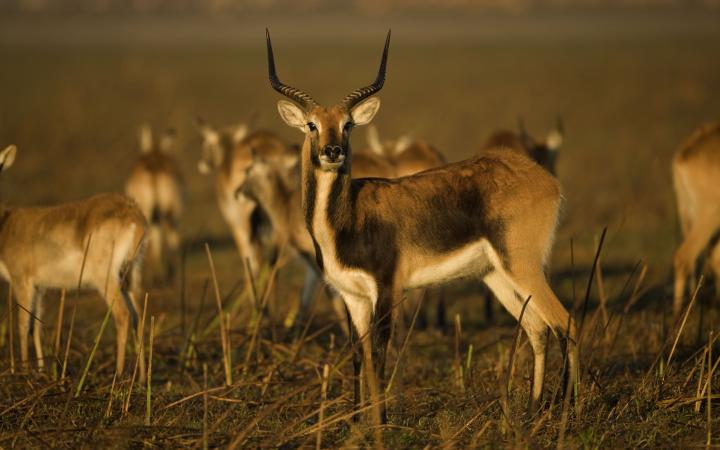Climate & Energy
Overview
Climate change is one of the biggest threats facing the planet and humanity.
It has the potential to have devastating impacts on the world’s political, economic and social stability. Some consequences are already irreversible, while others can still be stopped.
WHAT'S CAUSING CLIMATE CHANGE?
Global temperatures have been rising for over a century – speeding up in recent times to the highest on record. Since the industrial era, societies have relied on fossil fuels – like coal, oil and gas – which power our cars, buildings and industries. When burnt, they emit carbon dioxide, which traps heat in our atmosphere.
In the last 100 years, human activity has increased the Earth’s temperature by 1°C. By the end of this century, it could be anywhere between 1.4°C and 5°C higher. This will be very serious – not just environmentally but also for human health and well-being.
CLIMATE CHANGE IS HERE AND NOW
Worldwide, we’re already seeing more extreme weather, melting glaciers and rising sea levels. Our oceans are becoming more acidic, water supplies are dwindling, some food crops are struggling and many communities are being changed or destroyed.
The Gulf region is not immune. We’re already vulnerable to extreme heat and water shortages, so imagine what higher temperatures and more humidity may mean for life here? Most of our cities and industries are located in flat coastal areas, so these developments and peoples' livelihood are going to be impacted by more extreme weather events and rising seas.
IT'S NOT TOO LATE
To address climate change, humanity needs to urgently change our lifestyles and the way in which we produce and consume energy. The Paris Agreement in 2015 was a huge step forward, where over 200 countries agreed to limit warming to 2°C during the 21st century and ideally to 1.5°C. However, current global pledges to limit atmospheric warming to these levels are insufficient. Much more needs to be done.
THE UAE'S ROLE IS VITAL
As a regional leader in climate change action, a major oil producer and the first country from the Middle East region to ratify the Paris Agreement, the UAE has set an important example. And as the country’s various related strategies and plans become a reality, both the economy and society will benefit from diversification away from oil. New economic sectors will be developed, jobs will be created and human wellbeing preserved.
Global Action
The Paris Agreement entered into force on fourth November 2016, less than a year after it was agreed. This happened as a result of at least 55 countries representing at least 55% of global emissions ratifying the agreement – including the US and China, the two biggest emitters – triggering its early entry into force. The Paris Agreement aims to push all parties to put in place national strategies and policies that will collectively limit the rise in global temperatures to 1.5°C.
Rising Greenhouse Gases Can Be Mitigated
From 1994-2014, the UAE's greenhouse gas (GHG) emissions increased on average by about 5% per year. This was mostly driven by the country's energy sector and use of oil and gas. Mitigating the growth of UAE's GHG emissions can be achieved by lowering our consumption of fossil fuel based energy and replacing it with renewable sources, such as solar power.
Climate Change - Unpredictable Weather Globally
Even though we don't have much rainfall, the UAE has experienced storms that has led to flooding, causing disruption to travel, logistics and buildings for example. Climate change is predicted to lead to these sorts of extreme events becoming more intense and frequent.
Damage To Seas And Wildlife Globally
Our region is blessed with unique and sadly endangered marine wildlife such as turtles, dolphins, whales and coral reefs. Climate change is already making the Arabian Gulf more acidic and warmer, damaging coral reefs and affecting the myriad of species and people that depend on the sea for their livelihoods
Early Adaptation Will Help The UAE
Some climate change is unavoidable and a key part of the solution is to be prepared to adapt to these impacts. The UAE's national climate change plan 2017-50 includes measures for adapting to climate change and implementing this should mean that the UAE is well prepared to deal with climate change. Early action on the adaptation could also result in the UAE developing new innovative solutions and business opportunities.
What Emirates Nature-WWF is Doing
LEADING THE CHANGE
If left unchecked, climate change will alter the UAE and the wider region forever. However, Emirates Nature-WWF continues to support the significant steps required towards low-carbon living and development in the UAE. Through our leading research initiatives and science-based advisory role, we support governments, businesses and other stakeholders to ensure climate change remains high on the political and business agenda. And through raising awareness and educational activities, we help to promote energy and water efficiency, reduce the UAE’s ecological footprint and increase support for renewable energy.
The good news is, momentum is building. Renewable energy is gaining traction, the uptake of energy and water efficient technologies is increasing, and hybrid and electric cars are being sold at an ever-faster pace. The more we all act, the quicker we can achieve a more sustainable UAE.
ENERGY, WATER AND FUEL EFFICIENCY
Improving energy and water efficiency is crucial to reduce the country’s carbon emissions and tackle climate change. We’ve collaborated on vital research to help accelerate this in the private sector. In addition, under the Ecological Footprint Initiative (EFI), we’re working with partners to inform future transport policies – such as increasing the proportion of fuel-efficient cars and decreasing emissions. We’re also looking into working with banks, businesses and government to offer financial incentives that would encourage uptake of efficient technology.
SUPPORTING RENEWABLE ENERGY
Imagine if our lives and industries were powered by cheaper, cleaner sources of energy – such as solar or wind power. Emirates Nature-WWF aims to support the UAE in achieving its 44% renewable energy target, as stated in the National Energy Strategy 2050. By assessing whether targets can be surpassed and identifying a policy roadmap for achieving them, Emirates Nature-WWF aims to support the review of the national energy strategy 2050 targets and development of policies. With many projects, already successfully underway with positive results, the UAE has a real opportunity not just to reduce carbon emissions, but to drive future growth through leadership in this field.
REDUCING THE UAE ECOLOGICAL FOOTPRINT
With wide scale urbanisation, and a rapidly growing economy and population, the demand for energy and resources has increased greatly. In order to address these consumption patterns, in 2007, the UAE launched the Ecological Footprint Initiative (EFI). The EFI aims to develop science-based policies that result in a measurable reduction in the UAE’s carbon footprint, as it comprises the majority of the UAE’s Ecological footprint. Key achievements of the EFI include the development of an energy-efficiency standard and labelling system for indoor lighting (currently under implementation) in 2014, and recently, the completion of a technical study to support the development of a UAE vehicle fuel economy standard to reduce fuel consumption and CO2 emissions from new light-duty vehicles.
CLIMATE CHANGE AS A NATIONAL PRIORITY
Ultimately, success depends on ensuring climate change is a key consideration in the country’s planning, policies and lifestyle habits. So, through science, research and engaging with a range of stakeholders, Emirates Nature-WWF continues to highlight the risks that climate change poses, whilst proposing solutions to mitigate or adapt to these, and supporting the UAE towards a sustainable, low-carbon economy.









